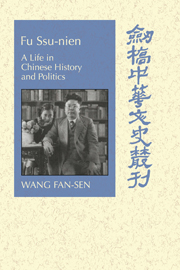Book contents
- Frontmatter
- Contents
- Acknowledgments
- List of Abbreviations
- Chronology
- Introduction: Fu Ssu-nien and Post-1895 Intellectual Trends
- 1 Fu Ssu-nien's Early Years
- 2 The Shaping of a New Historical School
- 3 Toward a Theory of Plural Origins of Chinese Civilization: Hypotheses on Ancient Chinese History
- 4 Contra-Introspective Moral Philosophy
- 5 The Burden of the May Fourth Mentality
- 6 Statism and the Later Days of a May Fourth Youth
- Conclusion: The Defeat of a May Fourth Youth
- Appendix I A Fragment from a Short Story Attacking Ku Chieh-kang
- Appendix II A Transcript of a Conversation between Fu Ssu-nien and Ch'en Pu-lei
- Glossary
- Bibliography
- Index
Introduction: Fu Ssu-nien and Post-1895 Intellectual Trends
Published online by Cambridge University Press: 01 February 2010
- Frontmatter
- Contents
- Acknowledgments
- List of Abbreviations
- Chronology
- Introduction: Fu Ssu-nien and Post-1895 Intellectual Trends
- 1 Fu Ssu-nien's Early Years
- 2 The Shaping of a New Historical School
- 3 Toward a Theory of Plural Origins of Chinese Civilization: Hypotheses on Ancient Chinese History
- 4 Contra-Introspective Moral Philosophy
- 5 The Burden of the May Fourth Mentality
- 6 Statism and the Later Days of a May Fourth Youth
- Conclusion: The Defeat of a May Fourth Youth
- Appendix I A Fragment from a Short Story Attacking Ku Chieh-kang
- Appendix II A Transcript of a Conversation between Fu Ssu-nien and Ch'en Pu-lei
- Glossary
- Bibliography
- Index
Summary
Fu Ssu-nien was born in 1896, in the immediate aftermath of the First Sino-Japanese War of 1894–1895, a major event in modern Chinese history and a shocking defeat at the hands of the Japanese. The war exerted enormous influence on the lives of Fu Ssu-nien and the men of his generation.
The outcome of the war was described by Liang Ch'i-ch'ao (1873–1929), who was old enough to feel the shock firsthand, as “the smashing of the dream of the past two thousand years.” Although China had repeatedly been defeated after the Opium War, its defeat at the hands of the Japanese was devastating and traumatic. Japan, after all, was an East Asian nation, one long viewed by the Chinese as having strong civilizational ties to China. What is more, Japan had begun transforming itself on the Western model after China had.
Some major transformations involving various Chinese intellectuals took place immediately after 1894–1895. In 1895 the leader of a revolutionary group, Sun Yat-sen (1866–1925), called the Japanese victory an unforeseeable event in Chinese history. He decided to organize his first anti-Manchu group, the Revive China Society (Hsing-chung-hui), in the winter of 1894, right after China had suffered a number of military defeats. K'ang Yu-wei (1858–1927), who later led the reform party, decided to convene about thirteen hundred chü-jen (provincial graduates) in Peking to encourage the emperor on reform.
- Type
- Chapter
- Information
- Fu Ssu-nienA Life in Chinese History and Politics, pp. 1 - 10Publisher: Cambridge University PressPrint publication year: 2000

